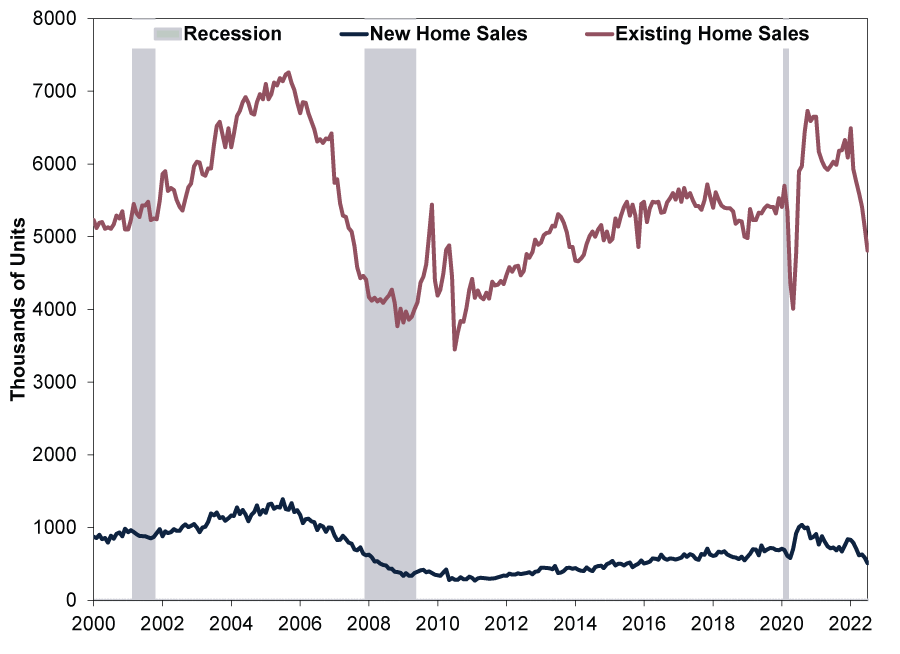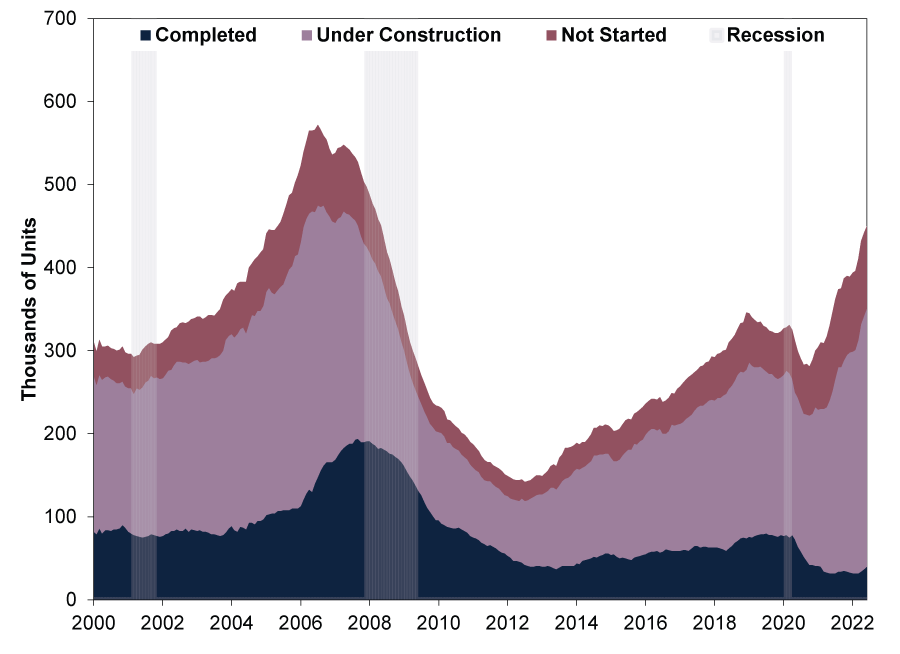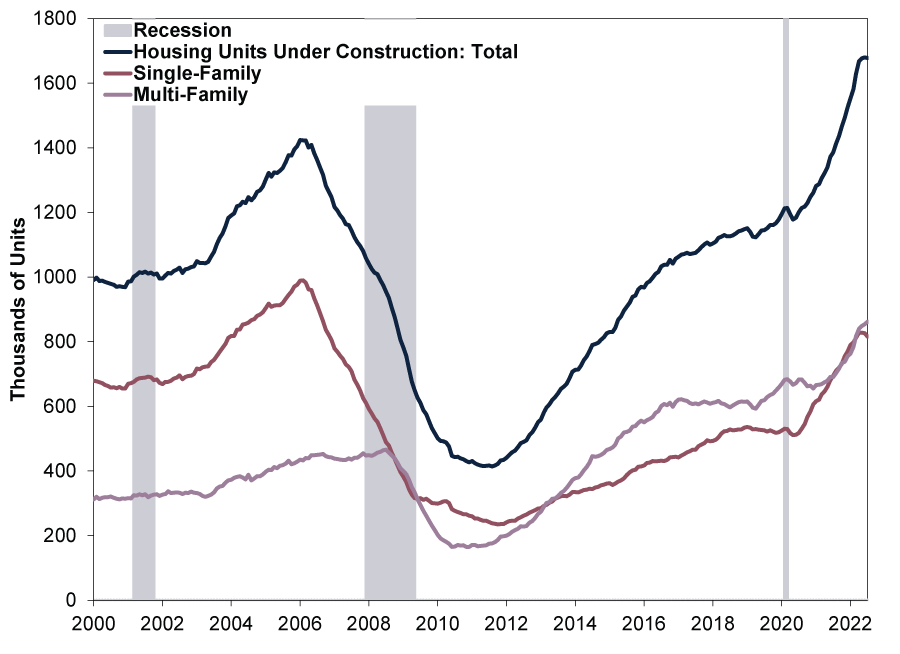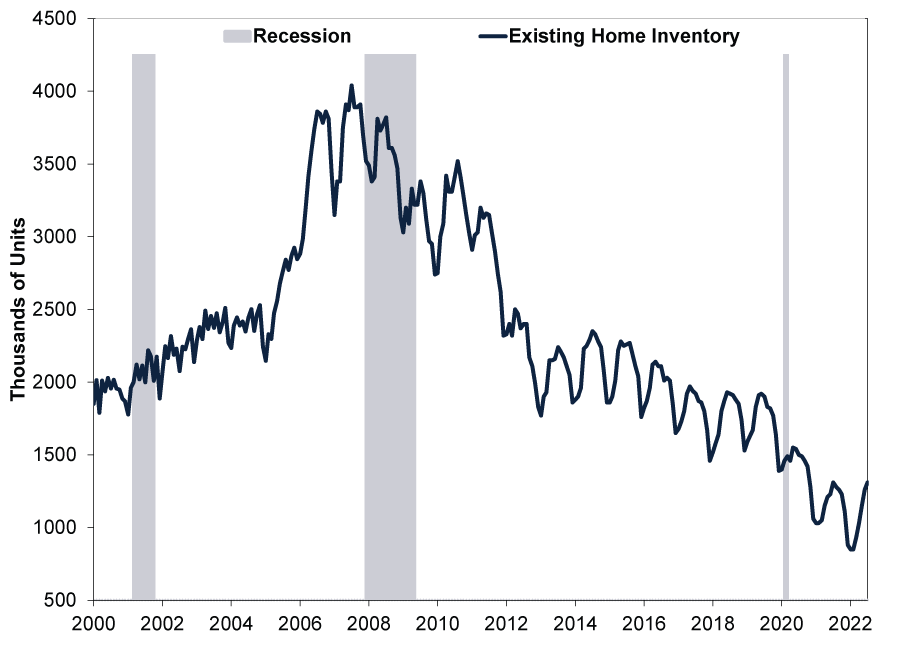Personal Wealth Management / Market Analysis
Will a ‘Housing Recession’ Spur Wider Economic Contraction?
A look at America’s housing market shows why we think a property crash won’t necessarily deliver a new hit to stocks.
With commentators we follow warning a UK property downturn looms, we think a look across the pond—where similar concerns have sprouted—may be instructive for investors. Last week, America’s National Association of Home Builders’ August survey suggested its members’ sales conditions are starting to deteriorate as US mortgage rates have doubled from last year, leading it to declare a “housing recession” is underway.[i] Besides ongoing supply chain problems lifting construction costs, builders noted cancellations are spiking. With American home inventories rising, housing starts slowing and reports of sellers slashing prices to attract baulking buyers, headline chatter over a potential residential real estate collapse is growing. Many of them warn such a downturn could hit the US economy hard—and send stocks slumping anew. But although the housing market may be weakening, we don’t think stocks are likely to mind much.
The American housing market has indeed hit a rough patch. US home sales have dropped sharply.
Exhibit 1: America’s Home Sales Sinking
Source: FactSet, as of 26/8/2022. US Census Bureau new privately owned houses sold and National Association of Realtors existing homes sold, January 2000 – July 2022.
Partly as a result, the inventory of new houses for sale has climbed rapidly.
Exhibit 2: US New Home Inventory Pipeline Swelling
Source: FactSet, as of 26/8/2022. US new privately owned houses for sale by stage of construction, January 2000 – July 2022.
In turn, seeing US home inventories on the rise amidst weakening sales, builders are apparently responding. After rising steadily the last few years, new home construction could be peaking.
Exhibit 3: New American Home Construction Starting to Slow?
Source: US Federal Reserve Bank of St. Louis, as of 26/8/2022. US total, single-family and multi-family new privately owned housing units under construction, January 2000 – July 2022.
Given this backdrop, some commentators we follow suggest US residential investment is set to tank, perhaps taking down purchases of durable goods like furniture and appliances with it—not unlike similar warnings we have seen about the potential for weakening investment in Britain’s private dwellings. They also draw comparisons to America’s extended property slide from 2006, which many commentators we follow think was the 2008 financial crisis’s trigger. But consider: Whilst US existing home inventories have increased, they remain historically low—very different from the 2000s’ latter half. Furthermore, inventory growth has slowed lately—it was flat year-over-year in July.
Exhibit 4: US Existing Home Inventory Historically Low (Even Without Seasonal Adjustment)
Source: FactSet, as of 26/8/2022. US National Association of Realtors inventory of existing homes for sale, January 2000 – July 2022. Not seasonally adjusted, hence the repeatedly choppy pattern.
What about all those new homes coming down the pike? US new home supply has apparently leapt—but that is largely an artefact of supply chain constraint skew. As Exhibit 2’s underlying breakdown reveals, most is under construction (purple) and not yet started (maroon). Completed homes for sale (navy blue) are still below nearly all levels pre-pandemic.
American builders may choose to pause starts and delay construction, awaiting further clarity on supply and demand dynamics. As new home construction is the primary way housing contributes to gross domestic product (GDP, a government produced measure of economic output), that seemingly happened in Q2. US residential investment fell -16.2% annualised last quarter, shaving -0.83 percentage point off headline GDP growth.[ii] As supply and demand adjust further, housing activity could slip more this quarter. Hence, all the focus on US builders’ outlooks, in our view.
However, we don’t think this is very significant. Many commentators we follow imply real estate drives a huge chunk of America’s economy, but in reality, residential investment is only 3.4% of its GDP.[iii] US housing’s economic footprint has been shrinking, too. Two decades ago, it stood around 5% of US GDP.[iv] Even if you expand today’s share to include American spending on goods like appliances and furniture, it increases to just 5.9%.[v] And we think that likely overstates things, considering it is a vast exaggeration to presume all appliance and furniture purchases are real estate related. Similarly, in the UK, private investment in dwellings was just 3.8% of GDP last year.[vi]
US residential investment can swing greatly, but our research shows other components like business investment have much larger influence—and move independently from the housing cycle. This is why we think past housing downturns haven’t automatically driven recessions (broad economic contraction) or bear markets (typically prolonged and fundamentally driven declines exceeding -20%). Since quarterly US GDP data start in 1947, residential investment fell in 119 of 301 quarters.[vii] Yet only 34 of these coincide with declining overall GDP. That shows it is a very volatile subcategory, in our view. Similarly, weak residential investment in America, like the decline in four of six quarters from Q3 2017 – Q4 2018, didn’t coincide with recession or contracting GDP. The same for four straight quarterly drops from Q3 1994 through Q2 1995.
For the UK, where data begin in 1997, private-sector dwelling investment declined in 47 of 100 quarters with only 10 of those coinciding with GDP contraction.[viii] When dwelling investment fell in 10 of 14 quarters during Q2 2004 – Q3 2007, overall UK GDP never did. This also held true from Q4 1999 to Q4 2001 as dwelling investment shrank in six of nine quarters.
Like the US, we don’t think housing dictates the UK’s broader economic direction. America’s residential real estate doesn’t look fantastic to us lately. But extrapolating this into a widespread crisis is a stretch, in our view. For the UK, too, which we find is in a roughly similar situation, even if official metrics have yet to show declining real estate market activity. Property is a volatile economic category with less impact than many commentators we follow suspect both here and in the US. Furthermore, because we think it is so widely watched and anticipated, housing market declines probably wouldn’t shock them. As surprise moves stocks most, we don’t think any “housing recession” will be a big stock market driver.[ix]
[i] “Homebuilders Say U.S. Is in a ‘Housing Recession’ as Sentiment Turns Negative,” Diana Olick, CNBC, 15/8/2022.
[ii] Source: US Bureau of Economic Analysis, as of 26/8/2022. Residential investment, Q2 2022.
[iii] Source: US Federal Reserve Bank of St. Louis, as of 26/8/2022. Residential investment as a percent of GDP, Q2 2022.
[iv] Source: US Federal Reserve Bank of St. Louis, as of 26/8/2022. Residential investment as a percent of GDP, Q2 2002.
[v] Source: US Federal Reserve Bank of St. Louis, as of 26/8/2022. Residential investment, furnishings and durable household equipment as a percent of GDP, Q2 2022.
[vi] Source: Office for National Statistics, as of 26/8/2022.
[vii] Source: US Bureau of Economic Analysis, as of 26/8/2022
[viii] See note vi.
[ix] See note i.
Get a weekly roundup of our market insights.
Sign up for our weekly e-mail newsletter.

See Our Investment Guides
The world of investing can seem like a giant maze. Fisher Investments UK has developed several informational and educational guides tackling a variety of investing topics.








